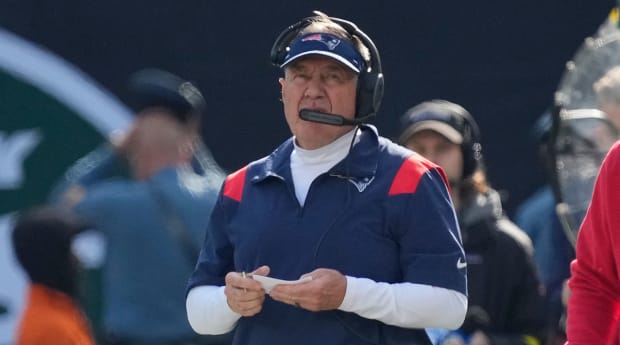After Sunday’s win over the Jets, it’s clear New England has the best defense in the NFL.
Saying the Patriots won Sunday’s game against the Jets on a punt return is like saying the sinking of a few submarines clinched a World War for the good guys (even though punt returns are awesome and almost never happen anymore). Sure, there was a definitive moment—a crossing of the plane which triggered a technical end to the matchup—but crediting that moment without recognizing the breadth and scope of the battle plan misses so much.
There are good enough reasons to have slept on Bill Belichick this year. The Patriots are still a middle-of-the-road football team. He employs the Springfield Police Department to design and call his offensive plays. He had the chance to go full-on Zappe Mode and he balked, depriving us of the onomatopoeia quarterback we had always dreamed of.
But as we speak, the Patriots have overtaken the Broncos as the best defense in football. Take your pick of telling advanced statistics, which come from even before holding the Jets without a touchdown Sunday: Patriots opponents are averaging 0.116 points per snap below league average, the lowest mark in the league, per Ben Baldwin’s open-source website. A mere 39.6% of passing plays against the Patriots result in what we should determine a “successful” down, via that same site. They are No. 1 in Football Outsiders’s DVOA rankings. Matthew Judon leads the league in sacks and makes about $15 million less than the highest-paid edge rusher in the NFL.
It’s particularly clear in the second halves of games. Over the past month, the Patriots are allowing fewer than 10 points per game after halftime, one of the best marks in the NFL.

Robert Deutsch/USA TODAY Sports
Earlier this season, we could see this in drips, even if the larger picture wasn’t quite clear. In Week 1, the Dolphins, one of the most dynamic offenses in the NFL, scored just three points in the second half against the Patriots largely due to a maddening quarters defense Belichick hurled onto the field. He toyed with the Dolphins’ fleet of backfield motioners, deployed coverages on a delayed basis and threw Tua Tagovailoa off his rhythm more noticeably than any other defense this year (despite the end result being a 20–7 Miami win). In Week 5, the Patriots shut out the Lions, one of the best offenses in the NFL, for all four quarters. On Sunday against the Jets, the Patriots allowed just two yards of total offense in the final 30 minutes. Let’s repeat that, since it probably shouldn’t be buried this deep into a football column: The Patriots’ defense gave up two yards over the course of an entire half. Six feet of offense in 25 plays.
Belichick isn’t just piling up numbers against some bad offenses. Ask around. If his defensive game plans were essays, half the league would fail a basic plagiarism checker, and those who aren’t still borrowing from his game plans are missing out on a good opportunity to make their teams better.
There’s not really a dynamic, headline-grabbing way to phrase this (sorry, editors), but Belichick is still here. He’s not back because he never left. He’s not on fire because he doesn’t really cool off, at least in terms of being a defensive game-planner. He’s not single-handedly lifting the Patriots because he needs players to execute (even if some of those players have told me that playing defense with Belichick’s voice wired into the green dot is akin, apparently, to playing chess with Hans Niemann and his friends).
It’s moments like these, the aftermath of a win that raises the Patriots to 6–4 and temporary possession of a wild-card spot, where it feels a little stunning, a little haughty, to hear the passive-aggressive complaining about Belichick that has cropped up. Back in March, Robert Kraft said it “bothered” him that the Patriots haven’t won a playoff game in a while, presumably like it bothers the lot of us that we haven’t scored on a Powerball ticket recently. LeSean McCoy said this week that Belichick is pedestrian without Tom Brady.
Belichick is still really, incredibly, unfathomably good at this. He may have picked the wrong lieutenants to try to modernize or streamline his offensive operation. He may need to evolve as an overseer of an entire club. I get that a plodding Mac Jones offense, with all the appeal of a Honda Accord drag race, is on his shoulders, too. I get that a season we roundly praised a year ago ended with a humiliating defeat.
That said, when members of the opposing organization are so frustrated that they’re calling the offensive performance “dog s---” or so quickly and vehemently denying there is an offensive problem at all so as to avoid the hard conversation, that is Belichick’s ultimate effect. That is the core of his being as a coach and it will never go away. It is Belichick removed from Brady and whatever else he has done in his previous three decades. And it isn’t just the Jets, either. He can do this to anyone at any time. Somehow, on an annual basis, some of us manage to forget that.
More NFL Coverage:
• The Night Flipper Anderson Set the Single-Game Receiving Record
• Inside the Upside-Down World of Long Snappers
• Justin Fields Has the Potential to Be a Top-Five Quarterback